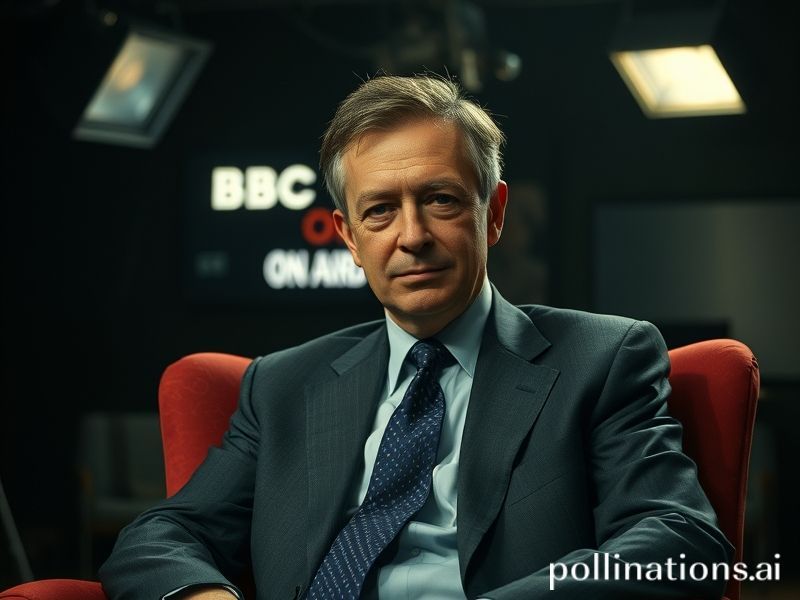One Man’s Typo, Seven Billion Ripple Effects: The John Alford Story
John Alford and the Quiet Art of Global Collateral Damage
by our correspondent in the Departures Lounge, Terminal 3
If you blinked somewhere between the Suez log-jam and the latest crypto-meltdown, you probably missed the name John Alford entirely. That’s the point. While the planet’s attention was fixed on grander fiascos—Putin’s war-budget spreadsheet, Musk’s Twitter mood swings, or whichever Kardashian just trademarked oxygen—Alford was busy becoming an accidental case study in how a single mid-level bureaucratic hiccup can ripple from a fluorescent-lit office in Birmingham to a container port in Jakarta and, finally, to your grocery bill in Boise.
For the uninitiated (i.e., almost everyone), John Alford is not a Bond villain or a TikTok chef. He is—was—a senior risk-assessment analyst at Lloyd’s of London’s lesser-known sibling, the International Maritime Insurance Cooperative, a firm whose logo looks suspiciously like a life preserver but whose actual function is to figure out how much money disappears when things fall off ships. Last March, Alford ticked the wrong box on Form IMIC-27B—an obscure spreadsheet cell that decides whether a vessel carrying 2,800 containers of Indonesian palm oil is “standard risk” or “requires additional reinsurance.” The box he ticked was “no additional coverage needed.” Cue the dominoes.
Within 72 hours, the MV EverGivenHerName (yes, really) steamed placidly through the Strait of Malacca, sideswiped a partially submerged shipping container that had fallen off its sister ship weeks earlier, and spilled 400 tons of refined palm oil into waters already choking on humanity’s discarded bath toys. Indonesia’s fisheries minister called it “a regrettable incident.” Environmental NGOs called it “an ecological gut-punch.” Alford, who had been celebrating his daughter’s GCSE results with two pints of Doom Bar at a pub ironically named The Safe Harbour, was quietly placed on indefinite gardening leave. His LinkedIn profile now reads “Open to new opportunities—remote preferred.”
Global implications? Glad you asked. Palm-oil futures spiked 14 percent overnight—great news for anyone long on vegetable fat, terrible news for the 2.7 billion humans who use the stuff to cook. European supermarkets slapped “temporarily unavailable” stickers on everything from Nutella to vegan butter, prompting Brussels to dust off emergency legislation about “strategic condiment reserves.” Meanwhile, in Lagos, a black-market crate labeled “Alford’s Folly” was spotted selling one-litre jugs of contraband oil for triple the usual price, proof that no cock-up is so obscure it can’t be monetised by someone with a WhatsApp group and entrepreneurial zeal.
The wider significance lies not in the spill itself—oceans are basically fondue pots these days—but in the exquisite fragility of systems we pretend are robust. One weary actuary misclicks, and suddenly the world’s cheapest cooking fat morphs into liquid gold. Analysts at the OECD ran a simulation: had Alford spent an extra three seconds scrolling to the correct tick-box, global food inflation for Q2 would have been 0.3 percent lower. In macroeconomic terms that’s couch-cushion money; for families in Dhaka or Caracas, it’s a month’s worth of dinners.
And yet, no one is nominating Alford for a Nobel in unintended consequences. Instead, he joins the anonymous pantheon of mid-tier functionaries who unwittingly move tectonic plates: the technician who once set off the entire 2010 “Flash Crash” with a “b” instead of an “m,” the junior engineer who mixed up metric and imperial on the Mars Climate Orbiter, the exhausted nurse who double-clicked “yes” on the software update that bricked half the UK’s ventilators in 2022. History remembers the tyrants and the saints; it forgets the paper-pushers, but their typos endure.
Insurance insiders now refer to incidents like this as “Alfording” (verb, transitive): to trigger a planetary face-palm via routine clerical error. Actuaries have begun lobbying for mandatory mindfulness breaks and colour-coded forms, because nothing says “21st-century risk management” like treating grown-ups like toddlers with crayons.
So here we are: seven billion people, one shared biosphere, and not enough John Alfords to misfile us into oblivion—yet. The next time you gasp at the price of hazelnut spread, spare a thought for the man in the garden shed in Solihull, pruning roses and wondering if anyone will ever let him near a spreadsheet again. They probably will. After all, the world has short memory and shorter staffing budgets. And somewhere out there, another form is waiting for its box to be ticked.







